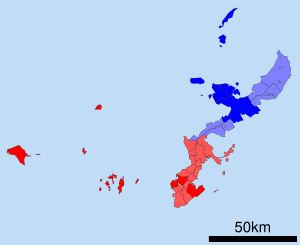Okinawan language facts for kids
Quick facts for kids Okinawan |
||||
|---|---|---|---|---|
| 沖縄口/ウチナーグチ Uchinaaguchi | ||||
| Native to | Japan | |||
| Region | Okinawa Islands | |||
| Native speakers | 980,000 (2000)e18 | |||
| Language family | ||||
| Writing system | Okinawan, Japanese, Rōmaji | |||
| Linguasphere | 45-CAC-ai 45-CAC-aj 45-CAC-ak |
|||

(South–Central) Okinawan, AKA Shuri–Naha
|
||||
|
||||
The Okinawan language (沖縄口, Uchināguchi) is a Ryukyuan language. It is spoken on the Okinawa Islands in Japan.
Most language experts believe Okinawan came from an old language. This language is called Proto-Japonic. Proto-Japonic is also the ancestor of the Japanese language. The Japanese government sometimes says Okinawan is a dialect of Japanese. This is often for political reasons.
Contents
The Story of Okinawan Language
Long ago, a group of people called the Yayoi arrived in the Ryukyu Islands. They brought a language called Proto-Japonic. Over many years, this Proto-Japonic language changed. It became the different Ryukyuan languages we know today. Proto-Japonic was also spoken in mainland Japan. There, it developed into the Japanese language. This means Japanese and Ryukyuan languages share the same origin.
Okinawan and other Ryukyuan languages faced unfair treatment from Japan. This happened during the Meiji period, a time of big changes in Japan. Because of this, fewer people spoke Okinawan. Before that time, Okinawan was the official language of the Ryukyu Kingdom.
How Okinawan is Related to Other Languages
Okinawan belongs to the group of Ryukyuan languages. It is part of the northern group. This group also includes the Kunigami and Amami languages. Sometimes, Kunigami is thought of as a dialect of Okinawan. However, this idea is not very common.
Who Speaks Okinawan Today
Most older people in Okinawa speak Okinawan. However, younger Okinawans usually speak Japanese. Because of this, UNESCO lists Okinawan as an "endangered" language. This means there is a risk that the language could disappear in the future.
How Okinawan Sounds Different from Japanese
There are many interesting sound changes between Standard Japanese and Okinawan. We can see these changes in the Shuri-Naha variety of Okinawan:
- Japanese "o" often becomes Okinawan "u". For example, Okinawa becomes Uchinaa.
- Japanese "k" often becomes Okinawan "ch". For example, Okinawa becomes Uchinaa.
- Japanese "mi" often becomes Okinawan "nn". For example, minato becomes nnatu.
Similar sound changes can be found in other Ryukyuan languages too. For instance, the Kunigami language also uses "u" instead of Japanese "o".
Learn Some Okinawan Words
Here are some common words in Okinawan:
- Mensooree (めんそーれー) - Welcome, Hello (when greeting someone arriving)
- Hai (はい) - Hello (can be used by anyone)
- Haisai (はいさい) - Hello (used by males)
- Haitai (はいたい) - Hello (used by females)
- Ganjyuu (がんじゅー) - Fine health (used in greetings)
- Uchinaaguchi (沖縄口/うちなーぐち) - Okinawan language
- Uchinaanchu (沖縄人/うちなーんちゅ) - An Okinawan person
- Yamatunchu (大和人/やまとぅんちゅ) - A Japanese person
- Yuntaku (ゆんたく) - Talking or chatting
- Waa (わー) - Informal way to say "me" or "I"
- Wan (我ん/わん) - Formal way to say "me" or "I"
- Iyaa (いやー) - Informal way to say "you"
- Unjyoo (御所/うんじょー) - Formal way to say "you"
- Un, uu (うん、うー) - Yes
- Aibiran (あいびらん) - No
- Furaa (ふらー) - Foolish
- Yinagu (女/よぃなぐ) - Woman
- Yikiga (男/よぃきが) - Man
- Warabaa, Warabi (わらばー、わらび) - Children
- Uya (うや) - Parents
- Kwa (きゎ) - A child (as opposed to parents)
- Niisee (にーせー) - A young man
- Boujya (ぼうじゃ) - A baby
- In (犬/いん) - A dog
- In-gwa (犬小/いんぎゎ) - Puppy
- Mayaa (猫/まやー) - A cat
- Mayaa-gwa (猫小/まやーぎゎ) - Kitty
- Hiijyaa (ひーじゃー) - A goat
- Uchinaa (うちなー) - Okinawa
- Yamatu (やまとっ) - Japan
- Too (とー) - China
- Chooshin (ちょーしん) - Korea
- Uranda (うらんだ) - Europe
Images for kids
See also
 In Spanish: Idioma okinawense para niños
In Spanish: Idioma okinawense para niños
 | Kyle Baker |
 | Joseph Yoakum |
 | Laura Wheeler Waring |
 | Henry Ossawa Tanner |


